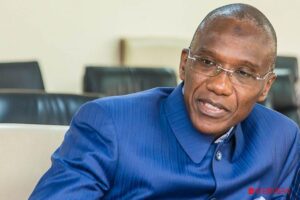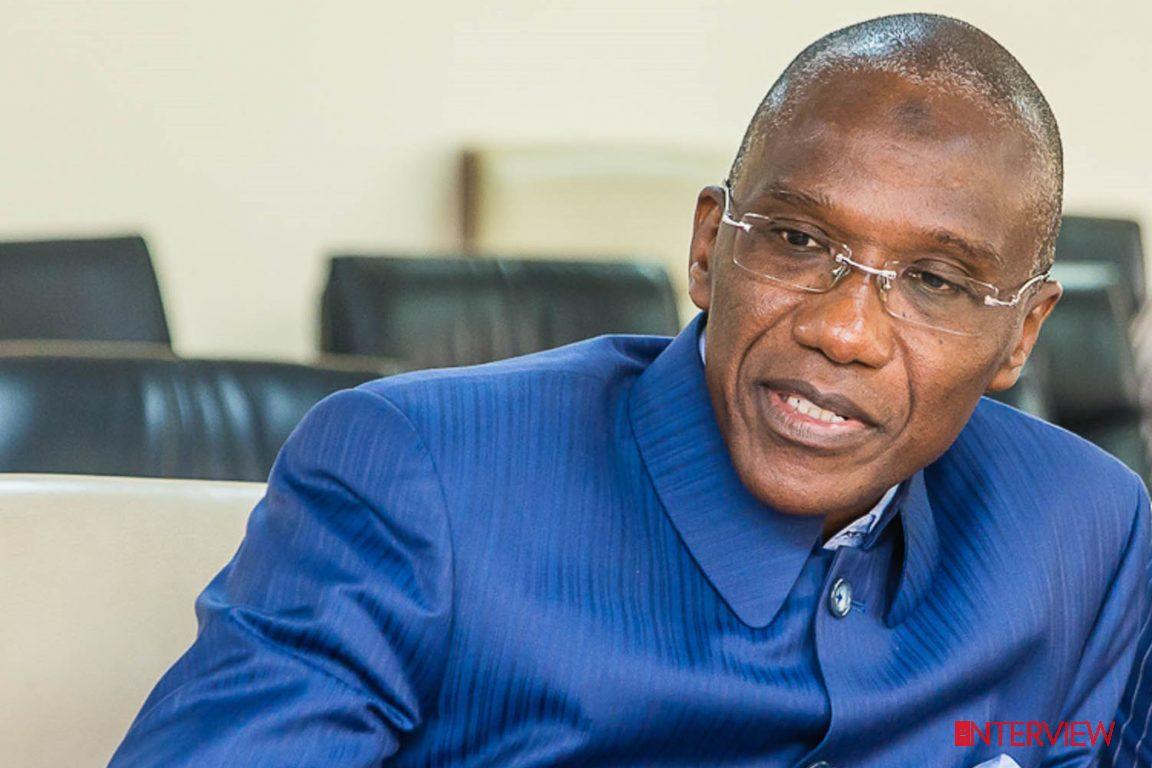
•Insists Arik owners must present resolution strategy that makes sense to corporation, CBN, Ministry of Finance
•Says N280bn realised from sale of 350 assets
Obinna Chima and Eromosele Abiodun (THISDAY Newspapers)
The Managing Director of the Assets Management Corporation (AMCON) yesterday, narrated how its proposed carrier, the Nigerian Eagle (NG Eagle), which ought to be its exit strategy from its aviation portfolio was frustrated by some aviation authorities.
Kuru, who spoke on the issue for the first time, during an interactive session with journalists in Lagos, said the aviation authorities frustrated the proposed airline because of unfounded rumors that NG Eagle was being mooted to be a national carrier.
In February 2016, AMCON fully took over the management of Aero Contractors after it dissolved the board of the company and the corporation became the majority shareholder. Aero Contractors is Nigeria’s oldest aviation company. It commenced business in 1959. Also in February 2017, AMCON took over Arik Air and became the receiver manager.
The debt resolution agency had scaled all hurdles required by law to set up a new airline, NG Eagle, before it was given the final Air Operating Certificate (AOC), to enable the new airline to commence scheduled operations.
However, commenting on the botched airline yesterday, Kuru explained that NG Eagle was actually set up to enable AMCON resolve Arik Air’s huge debts as well as the challenges Aero Contractor was facing, adding that it was at the verge of commencing operation with three branded aircraft waiting on the tarmac before it was frustrated.
According to Kuru, contrary to reports in a section of the media, AMCON did not go into Arik Air for debt recovery but to stabilise the company.
According to him, “What we decided to do at that time was that some of those assets doesn’t belong to only Arik. The assets belong to banks and AMCON. So we said why don’t we set up and independent airline and then move the assets into the new airline because those assets were not encumbered, and then that new airline would be disposed without any issues and there were quite a lot of investors who were interested in entering into the aviation space.
“We had meetings and started the process of setting up the NG Eagle airline. It took us almost two years to follow the process. At that time, the aviation ministry asked to see how they can help the process. “We had to get through the rigors of getting a licence and at the last point when we were just picking up the licence, the aviation industry come up to say we are planning to set up a national carrier. “We were frustrated, they reported to the National Assembly and started talking about past due obligations that were part of the original agreement. That was how we were frustrated.”
Speaking further, the former bank CEO said: “There were three aircraft that were branded, sitting on the tarmac and they sat on the tarmac for almost two years, which was strange to us in AMCON. We didn’t know when the aviation authorities started shifting position because they were with us all through the process, up to the point that we were about to take our licence.
“We were only interested in resolving a debt issues and that was interpreted to as setting up a national carrier. We were frustrated and we had to find a way of dealing with the licence because it was going to expire after a certain period if we didn’t use it. We therefore started a process and we were able to sell the license.”
Kuru explained further: “When we came on board around 2015, we never went near Arik, because at that time Arik was carrying 40 per cent of the passenger load. But by 2017, Arik enter into very big crisis: They were not paying salaries, they were not paying insurance, the technical partners had gone, the guys they brought from Ethiopia were going, they had more than N32 billion to pay the regulators – Federal Airport Authority of Nigeria and the Nigeria Civil Aviation Authority.
“Everything was wrong with Arik. Then the international community started writing and then the government felt that AMCON needed to support Arik. If we had not entered Arik in 2017, Arik wouldn’t have latest two weeks. So, we were able to pump money into Arik to make sure that they continued to fly.
“But today, everybody in the aviation industry will tell you that the sector is challenged. It is not only Arik or Aero Contractors that are facing challenges.”
According to Kuru, “the challenge of Sir Arumemi Johnson’s Arik Air Limited under the auspices of AMCON may seem difficult, but the situation is not irredeemable. There is always a way out of every resolution situation however, there must be a situation of give and take, which is what we (AMCON) has been trying to achieve.
“We are ready to sit down with the owner or owners of Arik if they are ready to agree on what makes sense to us, to them, and the federal government.
“When we engage and arrive at that agreement, we will as AMCON go back to the Central Bank of Nigeria (CBN) as well as the Ministry of Finance (MOF) and share such resolution strategy with them.
“If you recall, in the past, we resolved issues that are more difficult and more complicated than the Arik issue in the banks, oil and gas, manufacturing sector, real estate and investment, automobile, telecommunications, just to mention a few. But for any resolution to take place, the two parties or the parties involved must have understanding. We are convinced that there is always a way out.”
Since the coming of a new government led by President Bola Ahmed Tinubu, there has been heightened campaign by some recalcitrant AMCON debtors especially from its aviation portfolio that seeks to evoke the emotion of the public to perceive AMCON and its recovery activities from negative optical prism not minding the huge problem their debt to the federal government has caused the country.
He added: “AMCON is a resolution agency of the government, and we look forward to any obligor or debtor that wants to come discuss with us with repayment plans. Our doors are always open to resolve debts because that is our primary function.
“Aside from our recovery mandate, AMCON does not have a secret agenda. Transparency for us is very key. But, we also know that misinformation is part of the game, which is what some of our obligors specialise in but we want the media to know that we are very ready to provide accurate information. We deal with people who have interests and have issues with the organisation. It is nothing personal.
“The job we do at AMCON is not easy and I must commend my colleagues in AMCON – the staff because of their commitment against all odds. It is a difficult assignment, I must say. We deal with people that are in distress, and people that are desperately not ready to engage.
“When some of them (the obligors) heard the news of the proposed AMCON sunset, they stopped picking our calls. So, in their mind, they believe AMCON would soon close shop, which would mean that the government would write-off the debt. I want to state here today that the process of winding AMCON down will be a process, and nobody, no government would allow any debtor walk away. It is not possible.”
He pointed out that most of the assets in AMCON’s portfolio have challenges and litigations around them. This, he said was why the corporation introduced what was called assets tracing, so that it could face assets that were not provided as collateral by its debtors.
“After establishing that it belongs to them, we can then go to the court and establish that the assets truly belong to Mr. B and with a court order, we can have access to those assets. So, that was why we got the amendment of our Act.
“But what some of the obligors did was to leave the dead assets that have issues with AMCON and moved to something else. So, the only thing you can do is to follow them (debtors) and following them means you need to have the law behind you.
“So, through the assets tracing, we were able to follow them in their new endeavors to attach any assets they have,” the AMCON boss added.
He revealed that from about 12,000 accounts that the corporation purchased when it was created, it has been able to resolve more than 4,000 accounts.
“Out of the 12,700, only 350 accounts make up 84 per cent of all the total amount of debt owed AMCON. So, you can see the concentration. So, what we did was to focus on the 350 accounts because the 12,000 accounts is less than 20 per cent
“We have more than 3,000 cases in court and out of the 3,000 cases, the 350 accounts I told you earlier, represents 84 per cent of the total outstanding amount. Almost 264 of the 350, we are in court with them, which means you cannot even touch their assets.
“Since AMCON was established, we have sold just less than 350 assets. However, it is part of them mandate. Unfortunately, quite a lot of those assets you see outside with AMCON’s sign on them, we can’t even sell them because we are in court,” he added.
He put the total amount recorded from the 350 assets sold at N280 billion, saying that most of the businesses under AMCON’s management “are dead businesses.”






